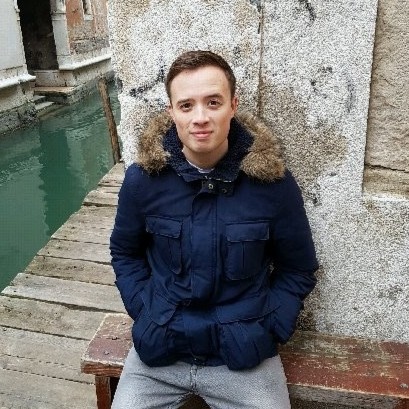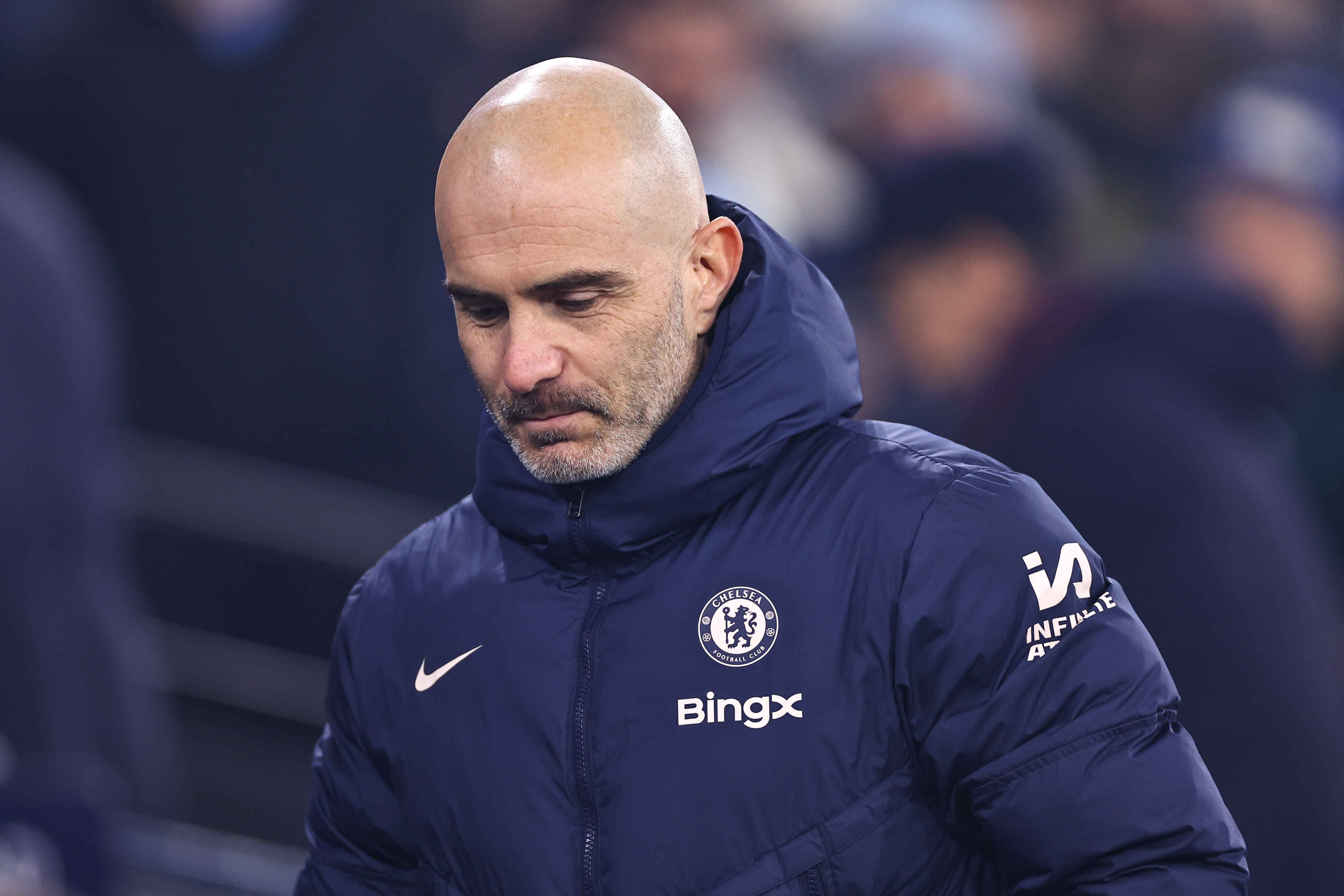FourFourTwo’s 50 Best Football Managers in the World 2016: 35-31
On we go, with a former Spurs and West Ham hitman, one of Europe’s most promising young managers and a Premier League newcomer
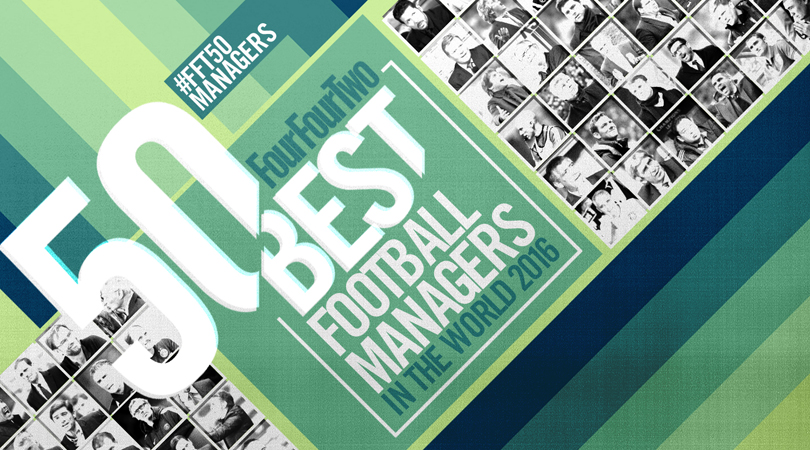
Words: Gregor Macgregor, Jonathan Harding, Tom Kundert, James Eastham.
35. Sergei Rebrov (Dynamo Kiev)
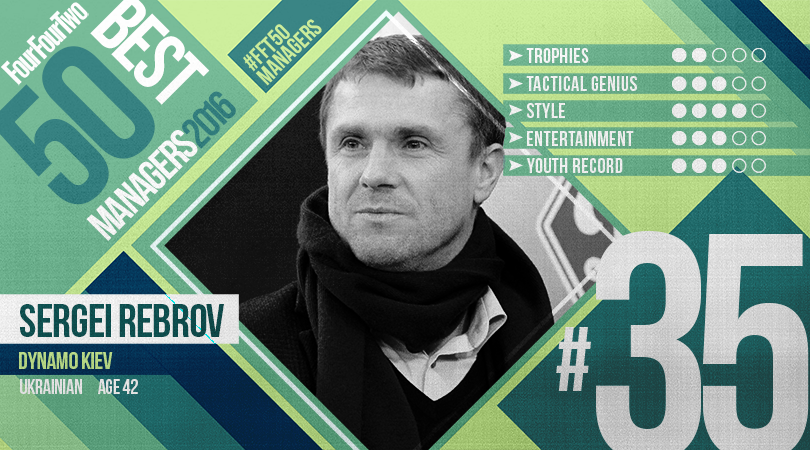
If it wasn't for Yaya Toure's left foot then who knows? The Ivorian's curling injury-time shot went a long way towards securing Manchester City's passage to the Champions League quarter-finals and knocking out Rebrov's battling Dynamo Kiev. A spirited performance in the return leg at the Etihad Stadium last March was scant reward for a European Cup campaign of quiet promise for the Ukrainian outfit, with just a solitary loss in the group stage.
At least next season they'll get the chance to show their progression under Rebrov further. The former Tottenham and West Ham forward has seen his side collect a second successive Ukrainian title following their unbeaten run to the title in 2015.
I sometimes drive home from the base at midnight, and Sergei is still there saying he wants to see some future rivals’ games. He also has a family, he's a young guy, but has devoted himself entirely to Dynamo
The unstable political situation in the Donbass region and unsettling of closest challengers Shakhtar continues to help the capital team's chances, of course, but 23 wins from 26 games last term continues the rich domestic form shown by Rebrov's side. The trophies are mounting up for the Ukrainian Premier League's all-time top scorer, who is proving equally adept in the dugout.
Rebrov has revealed previously that he has learned much from Russian coaching counterpart Kurban Berdyev with whom Rebrov won the 2008 Russian Premier League – featured here in this list – as well as Jurgen Klopp and Manuel Pellegrini. Rebrov reportedly visited the Chilean in late 2015 to watch a Manchester City coaching session, but was unable to due to City’s busy schedule at the time. Presumably he missed those sessions Toure spent working on how to cut in from the right… GM
34. Markus Weinzierl (Schalke)
Get FourFourTwo Newsletter
The best features, fun and footballing quizzes, straight to your inbox every week.
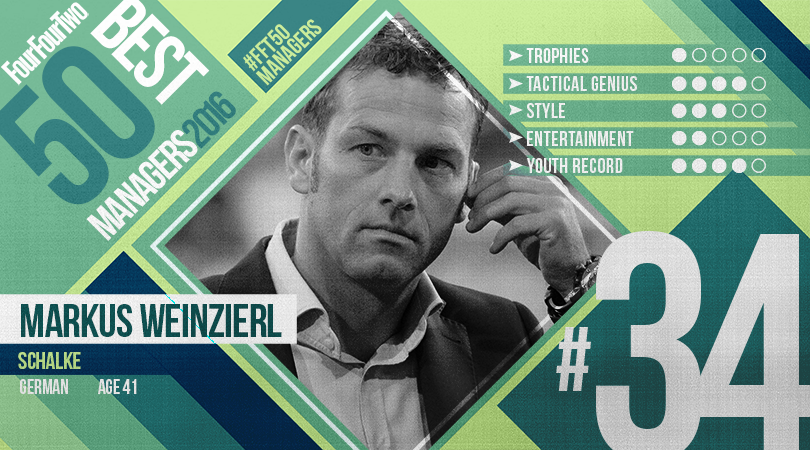
After last year, it didn’t look like things could get much better for Augsburg’s head coach. Faced with three competitions this time, however, Weinzierl improved again.
The 41-year-old’s ability to shuffle his squad when the going got tough was nothing new after last year’s heroics, but to do so and manage a trio of competitions was impressive. The gamble on Piotr Trochowski failed, but both Koo Ja-cheol and later Alfred Finnbogason proved pivotal recruits.
It’s not possible to beat Augsburg 5-0. I like the way Markus goes about his work and the way he doesn’t let the excitement run away with him. Augsburg are a special story in Germany
In decisive relegation battles near the end of the season, Augsburg beat Stuttgart and Werder Bremen in the space of two matchdays. In the Europa League, Weinzierl gave his team a chance and they rewarded him with a knockout tie against Liverpool after a miracle on the final matchday. He delivered when it mattered.
With a team whose players’ market value still averaged less than €2 million, Weinzierl not only fended off an inevitable relegation battle but created another season of history for Augsburg. He proved he can handle a bigger stage, which makes his next step at Schalke all the more intriguing. Success at one of Germany’s biggest clubs would see him join the country’s leading coaches. JH
33. Fernando Santos (Portugal)
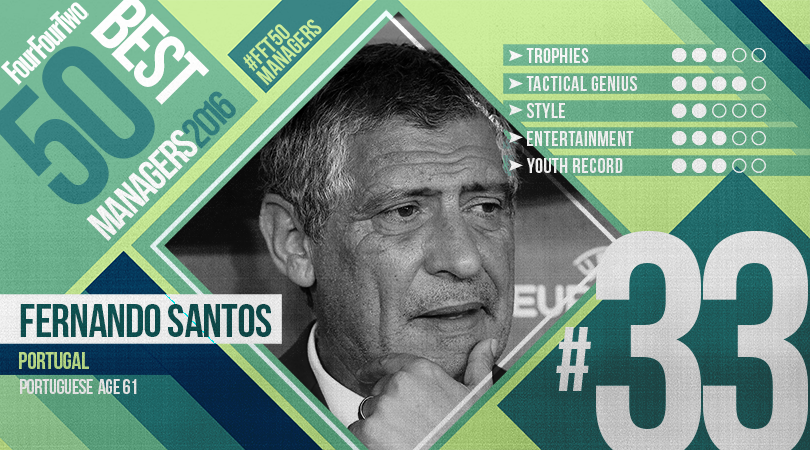
Amid the euphoria surrounding Portugal’s Euro 2016 triumph, it’s easy to forget that the appointment of Fernando Santos as the country’s head coach in September 2014 wasn’t greeted with enthusiasm.
With the national team in disarray, the prevailing opinion was that the Portuguese Football Federation had turned to Santos more because of a lack of credible and available alternatives than because of his track record in the dugout. A managerial CV that boasted Portugal’s three major clubs and many of Greece’s top teams before a long stint as Greece manager was embellished with just one major trophy – a championship title at Porto.
He is one of the few coaches to give me the confidence I needed. He deserves my respect forever
When Santos boldly proclaimed in his first press conference as Portugal coach that “I believe the Seleção have the quality to win the European Championship,” it did little to change perceptions. The results were immediately positive, though, as Santos guided the team through Euro 2016 qualification with uncharacteristic efficiency, winning all seven of their remaining matches to win Group I at a canter.
Sticking steadfastly to his mantra of making Portugal first and foremost a difficult team to beat, Santos maintained his upbeat message in France, even after three draws in the group stage. “I’ve told my family I’m only going back to Portugal on 11 July,” he declared after the draws against Iceland, Austria and Hungary.
Santos duly led a football-crazed country to the greatest moment in its sporting history, nurturing a strong spirit of togetherness that was fostered by the faith he showed in his entire squad (all 20 of Portugal’s outfield players saw the pitch at Euro 2016). He had his plan, stuck to it, and enjoyed a bit of luck along the way. TK
32. Claude Puel (Southampton)
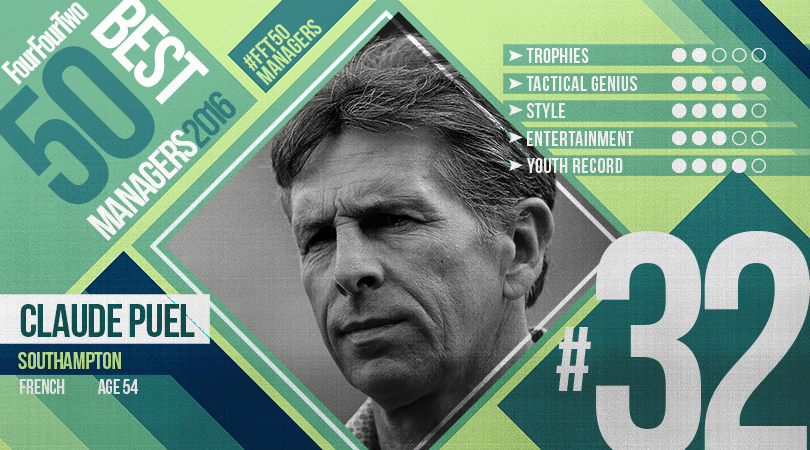
Even diehard Ligue 1 fans have to admit France’s top division can be a tough watch at times, which was why Puel’s Nice were such an unfettered delight in 2015/16.
The new Southampton manager set Nice up in a 4-1-2-1-2 system, asking his players to dominate possession – and the result was a team more entertaining than any other than runaway champions PSG.
The hardest thing for an attacking player? When he has time to think. So, with Claude Puel, who was then a fitness coach at Monaco, I went through session after session with dummies. I wasn’t born with a gift for goals
Puel’s tactics were successful, too: inspired by the reborn Hatem Ben Arfa – who credited his unexpected revival to Puel’s arm-round-the-shoulder man-management style – Nice finished fourth, meaning they will play in Europe next season.
Puel has enjoyed a high profile in France for years although his only trophy – a Ligue 1 title at Monaco – dates all the way back to 2000. He has a track record of improving clubs when he is given time – he did a good job over six years at Lille, and leaves Nice in better shape than he found them in four years ago.
You can see why Southampton went for him, but there are legitimate doubts over the appointment: this is Puel's first job outside France and recent cross-channel moves have hardly worked out well (Remi Garde and Alain Perrin spring to mind). Over to him. JE
31. Roger Schmidt (Bayer Leverkusen)
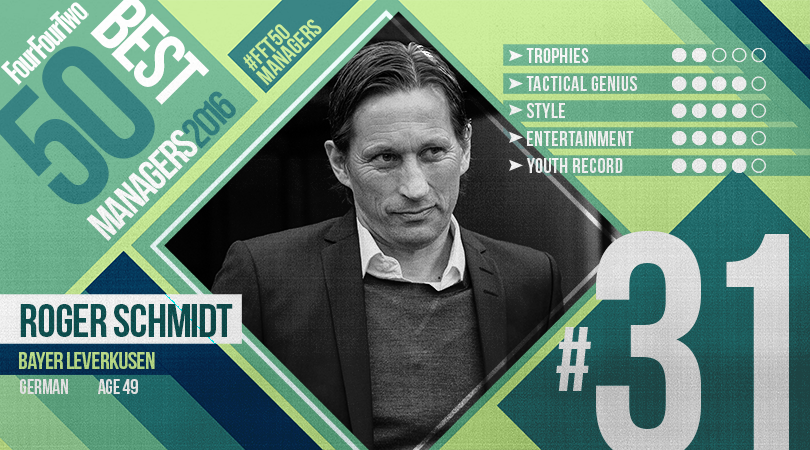
Make no mistake, Schmidt had another wobble during last season and when he lost it against Borussia Dortmund it looked like the beginning of the end. In increasingly Schmidt style, though, he recovered and led Bayer Leverkusen to seven wins from their final eight games.
With some players’ form fading – none more notable than Hakan Calhanoglu – Schmidt’s ability to move the pieces around was impressive. His reunion with Kevin Kampl proved fruitful, while the form of young duo Jonathan Tah and Julian Brandt was so hot that they made Germany’s preliminary Euro 2016 squad (Tah made it to the full one when Antonio Rudiger got injured). There was a feeling of what might have been had Chile international Charles Aranguiz not been injured all year.
When you see his passion day by day, his team talks, his practice sessions and the way he improves every player, we feel vindicated
If there’s one player Schmidt was grateful for more than others, though, it was Javier Hernandez. The Mexican became the goal source that Leverkusen looked like they’d lost after Stefan Kiessling turned 30, netting 26 times in 43 games in all competitions.
Schmidt’s absence after his touchline outburst nearly cost the club, but it looks like he’s learned his lesson. He consistently returns Leverkusen to the Champions League, although their Europa League exit to Villarreal was disappointing.
There’s so much to look forward to, though: great work in the summer transfer market has set up both him and Leverkusen for what might be their most exciting year yet. JH
50-46 • 45-41 • 40-36 • 35-31 • 30-26 • 25-21
FourFourTwo's 50 Best Football Managers in the World 2016
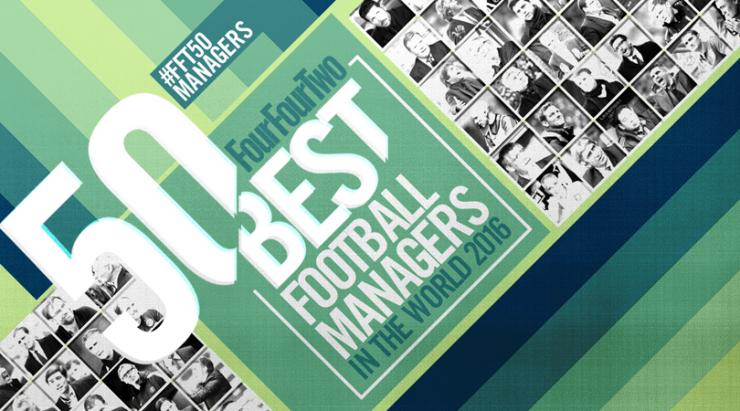
Joe was the Deputy Editor at FourFourTwo until 2022, having risen through the FFT academy and been on the brand since 2013 in various capacities.
By weekend and frustrating midweek night he is a Leicester City fan, and in 2020 co-wrote the autobiography of former Foxes winger Matt Piper – subsequently listed for both the Telegraph and William Hill Sports Book of the Year awards.
